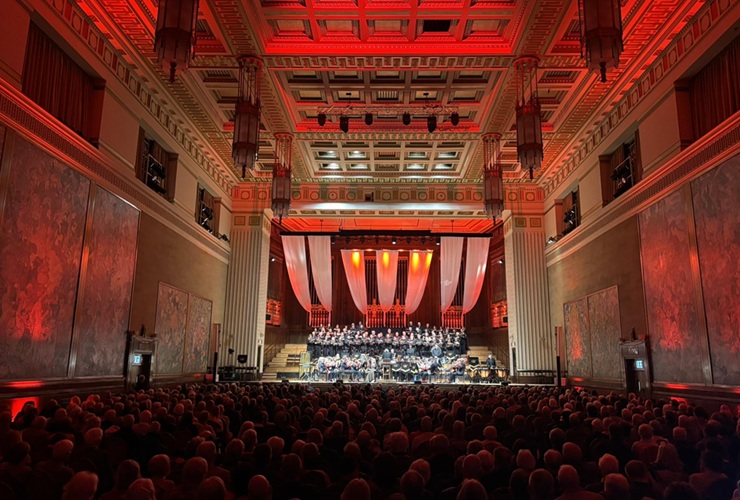
Featuring: Cor Caerdydd; Aldbourne Band
Conductors: Sir Karl Jenkins CBE; Dr Robert Childs
Soloists: Kathryn Rudge; Zands Duggan; Osama Kiwan
Brangwyn Hall, Swansea
Sunday 19th October

'The Armed Man' has resonated with global audiences ever since it was commissioned by the Royal Armouries to mark the museum’s move from London to Leeds at the turn of the millennium.
Over 25 years and 3600 plus performances later it remains a melodic paean for peace; first through its dedication to the victims of the Kosovo Crisis and subsequently as a cry of anti-war sentiment - from performances to mark the 10th anniversary of 9/11 through to the conflicts that engulf the globe today.
Those thoughts were surely in the minds of an audience of around a thousand people who made their way to the Brangwyn Hall for this special Welsh premiere conducted by the composer of a version skilfully re-orchestrated by Dr Robert Childs to incorporate brass band accompaniment.
Fragile Earth
Any reservations were quickly allayed with Aldbourne’s finely judged rendition of ‘Fragile Earth’ - Jenkins’ 2024 response to the global threat, not of warfare, but of climate change; the opening ‘Scorched Earth’ evoking a menace that even in an age of carbon capture targets continues to engulf habitats in its tinder-dry heat.
the opening ‘Scorched Earth’ evoking a menace that even in an age of carbon capture targets continues to engulf habitats in its tinder-dry heat.
‘The Blue’ (with its clever aural imagery) spoke of the diminishing majesty of marine environment, whilst ‘Flight’, rather than offering unattainable hope, captured the inexorable drive towards annihilation through decisions and themes repeated time and time again.
Hope
‘The Armed Man’ does speak of hope however – the finale, ‘Better is Peace’ with its biblical quotation from ‘Revelations’ drawing the work to a close in praise after a journey that drew on the history of global conflict through a poetic eye – Horace, Dryden and Swift, Mallory and Tennyson, the Adhaan and Mahabharata to author Rudyard Kipling, and military historian Guy Wilson.
The standing ovation spoke not only of the excellence of the performance, but of the effect a touchstone work for a millennial generation continues to have on those who hear it.
The effect, drawn with every increasing melodic tension remains an absorbing experience; Jenkins’ embracing global as well as historical influences, from the opening 15th century French folk-song to the sound of the Catholic mass and Arabic call to prayer, to despair of Hiroshima and the eternal sound of ‘The Last Post’.
The standing ovation spoke not only of the excellence of the performance, but of the effect a touchstone work for a millennial generation continues to have on those who hear it.
Iwan Fox









